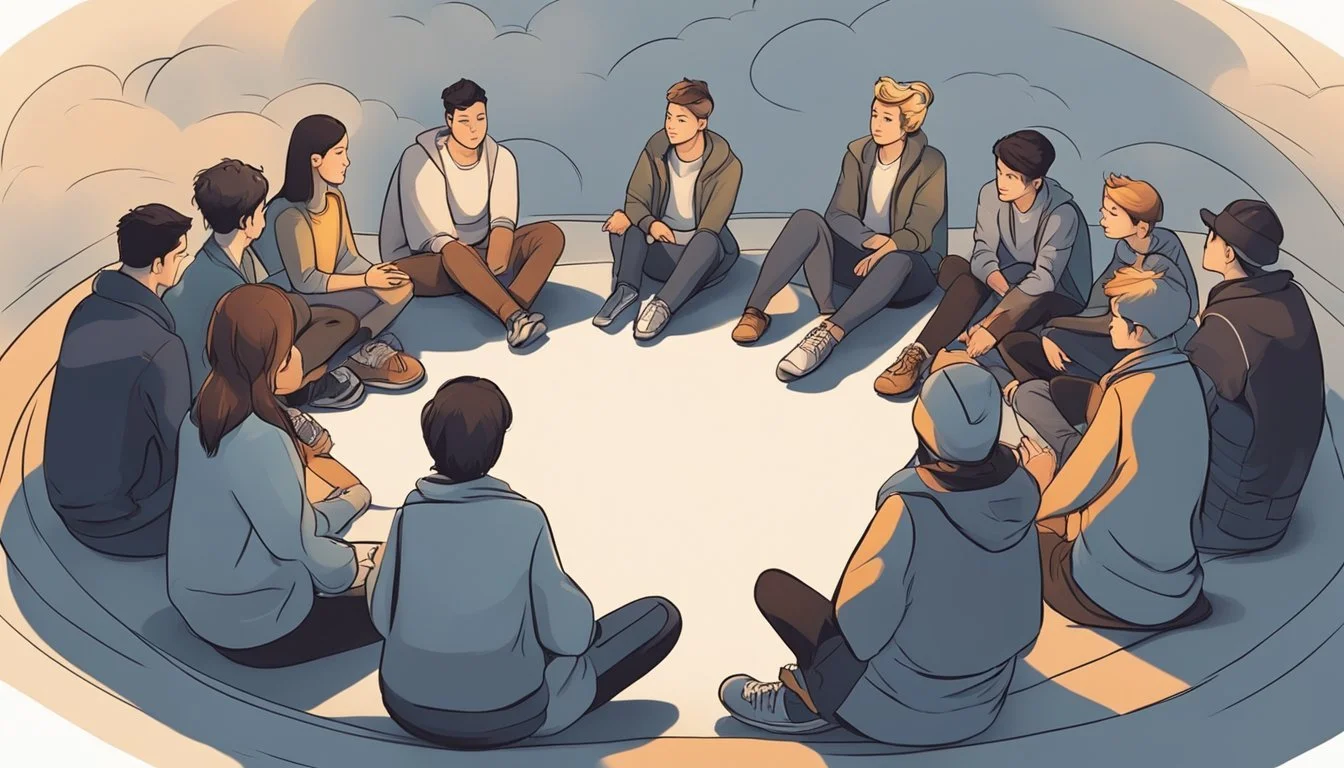4 Strategies for Handling a Friend Who's Always Playing the Victim
Practical Tips for Effective Communication
Dealing with a friend who constantly plays the victim can be challenging and emotionally draining. It's crucial to approach the situation with empathy and understanding, recognizing that their behavior often stems from deeper psychological issues.
Understanding how to navigate this dynamic effectively can help maintain the friendship while also ensuring personal boundaries are respected. This article will explore four practical strategies to handle such situations, providing guidance and actionable steps to manage and improve the relationship with a friend who exhibits a victim mentality.
1) Set Boundaries
Setting boundaries is crucial when dealing with a friend who often plays the victim. Encourage direct communication and clear limits.
Communicate your boundaries explicitly. This could be as simple as stating when certain topics are off-limits or when you need personal space.
Be consistent with your boundaries. Inconsistency can confuse your friend and lead to repeated behaviors.
Ensure boundaries are respectful. They should protect your well-being without being punitive.
Use firm but compassionate language. Avoid accusatory tones, focusing instead on your needs and boundaries.
Stick to time limits. Minimizing lengthy complain sessions can help manage emotional strain.
Suggest alternative perspectives. Gently encourage viewing challenges with a problem-solving mindset.
Setting boundaries also involves not enabling negative behavior. For example, avoid immediately agreeing when your friend blames others.
If needed, take breaks from interactions to maintain your mental health.
Consistency and compassion are key to effectively setting and maintaining boundaries with a friend who adopts a victim mentality.
For more detailed tips, you can explore Healthline's guide on the subject.
2) Encourage Professional Help
Encouraging your friend to seek professional help can be a crucial step. A licensed therapist or counselor can provide the tools and strategies needed to address and manage a victim mentality. Professionals are trained to deal with deep-seated issues, offering a level of support and expertise that friends may not be able to provide.
Suggesting therapy should be done with care and sensitivity. Avoid making it sound like an accusation or critique. Instead, frame it as a way to find support for their feelings. You might say, “A therapist could really help you navigate these challenges.”
It's important to approach the conversation at an appropriate time. Choose a moment when your friend is calm and more likely to be receptive. Avoid bringing it up during heated discussions or when emotions are running high.
Sometimes, people may resist the idea of therapy due to stigma or fear. Be prepared to provide reassurance and information on how professional help can be beneficial. Sharing positive experiences or outcomes from therapy can also be motivating.
Encourage your friend by offering to help them find a suitable therapist. You could help in researching or even accompany them to their first session if they feel anxious. Taking these steps can make the transition to professional help smoother for them.
3) Communicate Openly
Open communication is key when dealing with a friend who frequently plays the victim. It's important to address their behavior directly but with compassion. Express your observations without sounding accusatory.
Avoid using a confrontational tone. Instead, use "I" statements to reflect how their actions affect you. For example, say "I feel worried when you constantly see yourself as the victim."
Listening is just as crucial as speaking. Give them a chance to share their thoughts and feelings without interruption. This shows empathy and helps build trust.
Help them see different perspectives. Point out instances where they could view situations more positively. This can encourage a shift in their mindset over time.
Setting boundaries is essential. Without clear lines, their behavior might drain your energy. Politely, but firmly, let them know when certain conversations or behaviors are becoming too much for you to handle.
Suggest professional help if you feel it's needed. Offer to support them in seeking therapy or counseling. This can be particularly beneficial if their victim mentality is deeply ingrained and affects their daily life.
4) Show Empathy and Understanding
Showing empathy and understanding can be both powerful and essential when dealing with a friend who consistently plays the victim. It's important to listen actively to their concerns. This means acknowledging their feelings and validating their experiences without necessarily agreeing with their perspective.
When your friend shares their struggles, consider responding with phrases like "That sounds really tough" or "I can see why you feel that way." This approach helps to build trust and shows that you care about their well-being.
It's equally important to maintain healthy boundaries. While showing empathy, ensure you do not get emotionally entangled in their problems. Encourage them to express their feelings but also remind them that seeking professional support might be beneficial.
Reflecting their feelings back to them can also be effective. For example, saying "It seems like you're feeling very frustrated" can help them feel heard. This could also help them gain insight into their own emotional patterns.
Providing a listening ear without offering unsolicited advice can often make a significant difference. Sometimes, people just need someone to listen without judgment. This can foster a supportive environment while preventing you from being drawn into their drama.
In summary, maintaining empathy and understanding while keeping boundaries can lead to a more balanced and healthy relationship.
Understanding the Victim Mentality
People with a victim mentality often struggle with feelings of helplessness and a pervasive sense of injustice. Understanding the psychological basis and recognizing common traits can help in addressing these behaviors effectively.
Psychological Basis
The victim mentality often stems from deep-seated psychological issues. Individuals who exhibit this mindset might have experienced significant trauma or adversity in their lives. These events can create a pattern of thinking where the individual feels constantly wronged or unfairly treated.
It is also linked to conditions such as depression or PTSD, which exacerbate feelings of helplessness and hopelessness. This mindset may become a coping mechanism for dealing with overwhelming emotions, as it provides an external entity to blame for their struggles. Through continual reinforcement of these thoughts, the victim mentality can become deeply ingrained.
Common Traits and Behaviors
Those with a victim mentality typically display certain traits and behaviors. They often seek validation for their perceived victimhood, expressing their frustration through constant complaints about life's unfairness. This behavior can lead to them frequently lamenting over setbacks, real or perceived, and seeking sympathy from those around them.
Another hallmark is low self-esteem and lack of self-confidence, which can make them heavily reliant on others for emotional support. This mentality contributes to a cycle of negativity, where individuals feel trapped and unable to see a path forward. Addressing these traits involves a combination of empathy and assertive boundaries, helping them recognize their patterns and encouraging more positive behaviors.
Communicating Effectively
Approaching a friend who tends to play the victim requires empathy and clear boundaries. Using active listening techniques and setting firm boundaries can help mitigate misunderstandings and promote healthier interactions.
Active Listening Techniques
Active listening involves paying full attention to the speaker and providing feedback. Key techniques include maintaining eye contact, nodding, and providing verbal affirmations like "I understand" or "That sounds tough". This shows that the listener is genuinely engaged.
Reflecting back what the speaker has said is also crucial. For example, "It sounds like you're feeling overwhelmed because of work." This not only validates their feelings but also encourages them to open up more.
Avoid interrupting or judging their statements. Responding non-judgmentally fosters a safe space for the friend to share their concerns. Summarize key points of what the friend says occasionally to ensure understanding and clarity.
Setting Boundaries
Establishing clear boundaries prevents the conversation from becoming too one-sided. Politely explain that while you want to support them, it's important to maintain a balanced dialogue. For instance, suggest a time limit for discussing certain issues.
Use "I" statements to express your needs, such as "I feel drained when our conversations focus solely on negative experiences." This approach reduces the chances of the friend feeling attacked. Be prepared to step away from the conversation if it becomes too intense or repetitive.
Encourage topics that are more neutral or positive after discussing sensitive subjects. Redirecting the conversation can help lighten the mood and introduce a more balanced interaction. For example, suggest discussing shared interests or upcoming positive events.
Encouraging Personal Responsibility
Encouraging personal responsibility in a friend who frequently plays the victim involves fostering self-reflection and suggesting professional help when necessary. These approaches can guide them towards healthier perspectives and behaviors.
Promoting Self-Reflection
Helping a friend engage in self-reflection is crucial. Encourage them to consider their role in various situations. Ask open-ended questions such as, “What part did you play in this scenario?” or “How could you have approached this differently?”
Journaling can be a helpful tool. Suggest they maintain a journal of their thoughts and feelings, which can help them recognize patterns in their behavior. This can lead to key insights and a deeper understanding of their responses to different circumstances.
Another effective technique is mirror conversations. This involves discussing hypothetical situations where the roles are reversed. Ask them how they would feel or react if they were in the other person's shoes. This can significantly enhance their empathy and understanding.
Suggesting Professional Help
Sometimes, professional help is necessary to address deeper issues. Encourage your friend to seek support from mental health professionals. Therapists and counselors can provide guidance that is both objective and safe.
Refer them to reputable sources like licensed therapists. Emphasize that therapy is a positive step towards their well-being, not a sign of weakness. They can learn coping mechanisms and strategies to shift their mindset.
Support groups are also a valuable resource, offering a community of individuals who may have similar experiences. This can help your friend feel less isolated and more understood while gaining practical advice from peers.
By promoting personal responsibility through self-reflection and professional help, you can assist your friend in overcoming the cycle of victimhood.




